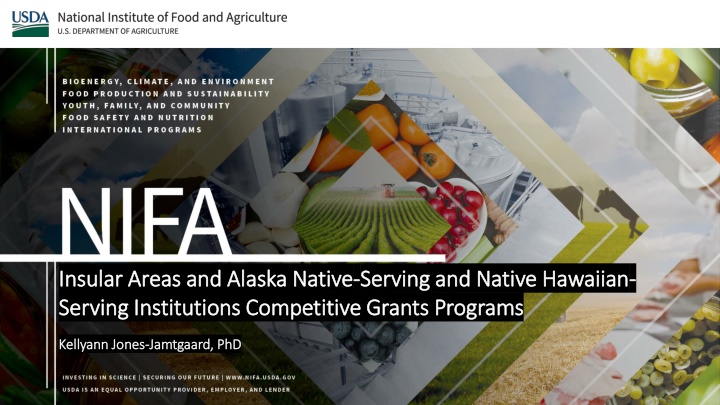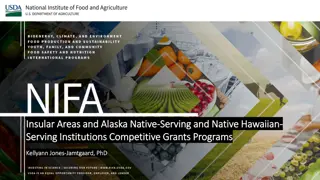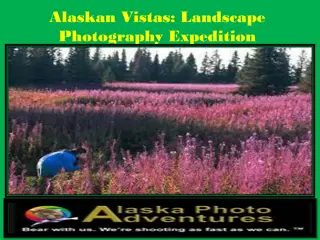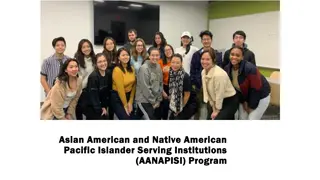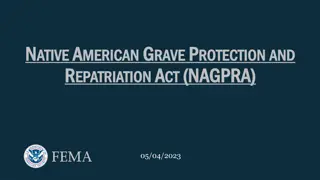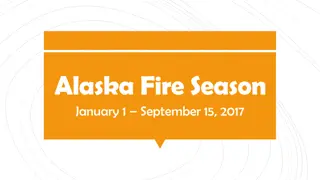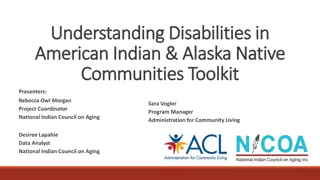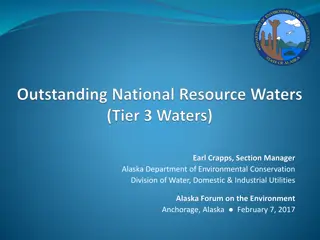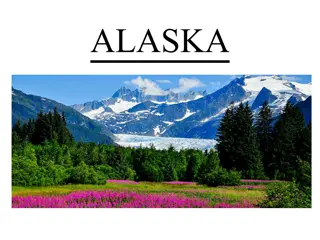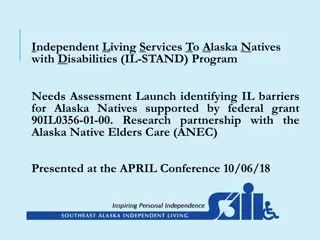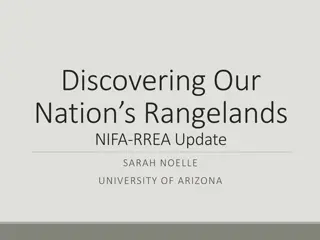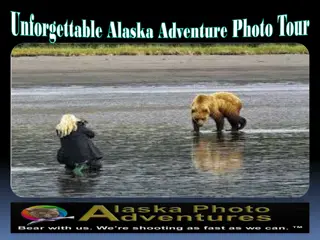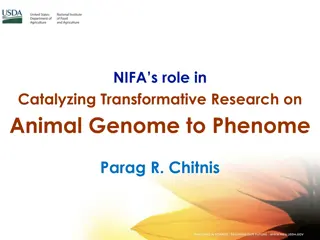NIFA Competitive Programs for Insular Areas and Alaska Native Serving Institutions
NIFA provides competitive grants for agricultural research, education, and extension programs in insular areas and Alaska Native serving institutions. Topics covered include advanced technologies, food science, animal health, environmental sustainability, business and economy, farming practices, and more. Programs such as Distance Education Grants and Resident Instruction Grants aim to support higher education institutions in insular areas. The mission of NIFA is to address societal challenges through investments in agricultural initiatives.
Download Presentation

Please find below an Image/Link to download the presentation.
The content on the website is provided AS IS for your information and personal use only. It may not be sold, licensed, or shared on other websites without obtaining consent from the author.If you encounter any issues during the download, it is possible that the publisher has removed the file from their server.
You are allowed to download the files provided on this website for personal or commercial use, subject to the condition that they are used lawfully. All files are the property of their respective owners.
The content on the website is provided AS IS for your information and personal use only. It may not be sold, licensed, or shared on other websites without obtaining consent from the author.
E N D
Presentation Transcript
Insular Areas and Alaska Native Insular Areas and Alaska Native- -Serving and Native Hawaiian Serving Institutions Competitive Grants Programs Serving Institutions Competitive Grants Programs Serving and Native Hawaiian- - Kellyann Jones Kellyann Jones- -Jamtgaard Jamtgaard, PhD , PhD
Program Staff Program Staff Dorissel Resto, M.S. Program Specialist Dorissel.Resto@usda.gov Kellyann Jones-Jamtgaard, PhD National Program Leader kellyann.jonesjamtgaard@usda.gov
NIFAs Mission NIFA s Mission To invest in and advance agricultural research, education and extension to solve societal challenges. NIFA provides: Capacity grants to land-grant universities Competitive grants to support research, education and extension at various institutions including: Land-grant universities, non-land-grants, minority-serving institutions, community colleges, and other organizations A
Topics Covered by NIFA Programs Topics Covered by NIFA Programs Advanced Technologies Bioenergy; Biotechnology; Nanotechnology Education Minority Serving Institutions; Teaching and Learning; Workforce Development Food Science Food Quality; Food Safety Food and Nutrition Security Nutrition; Obesity; Wellness Animals Animal Breeding; Animal Health; Animal Production; Aquaculture Environment Climate Change; Ecosystems; Invasive Pests and Diseases International Global Engagement; Global Food Security Business and Economy Markets and Trade; Natural Resource Economics; Small Business Farming and Ranching Agriculture Safety & Technology; Farmer Education; Organic & Family Farms Plants Crop Production; Pest Management; Plant Breeding; Plant Health Natural Resources Forests; Grassland and Rangeland; Soil, Water, and Air Human Sciences Community Vitality; Family Well-Being; Youth 4
NIFA Competitive Programs for the Insular Areas NIFA Competitive Programs for the Insular Areas 1. Distance Education Grants (DEG) Program for Institutions of Higher Education in Insular Areas 2. Resident Instruction Grants Program for Institutions of Higher Education in Insular Areas (RIIA) Eligibility: Public or non-profit 2-year and 4-year accredited institutions of higher education that offer certificate/degree programs in the agricultural sciences in an Insular Area. Type of Grant: Teaching and Education 3. Agriculture and Food Sciences Facilities and Equipment (AGFEI) Eligibility: individual land-grant colleges and universities, and other institutions that have secured land-grant status through Federal legislation, and which are located at Insular Areas Type of Grant: Facilities and Equipment 5 D
NIFA Competitive Programs for the Insular Areas.. NIFA Competitive Programs for the Insular Areas.. Since 2005, NIFA has funded 63 grants for a total amount of $12.5 million in the Pacific Area FY 2024 Anticipated total funding available: $2.3 million FY 2024 RIIA/AGFEI application deadline is February 28, 2024 FY 2024 DEG application deadline is March 20, 2024 6 D
Distance Education Grants Distance Education Grants Title: Development of Online Courses in Tropical Wildlife Management Purpose is to strengthen the capacity of institutions to carry out programs in the food and agricultural sciences through distance educationtechnology. Institution: University of Guam Grantees can use funds to: Acquire equipment, networking capability, hardware/software, and infrastructure to support distance education Curriculum development and enhancing educational services Provide professional development for educators in using technology in the classroom 7 D
Resident Instruction Grants for Institutions of Resident Instruction Grants for Institutions of Higher Education in Insular Areas Higher Education in Insular Areas Purpose is to promote and strengthen the ability of eligible institutions in the Insular Areas to carry out education within the food and agricultural sciences. Grantees can use funds for: Recruit and retain undergraduate and graduate students to need areas in food and agricultural sciences, including scholarships Experiential learning opportunities Curriculum development, scientific instrumentation for teaching, improving library capacity Professional development for faculty Title: Building student and professional capacity in Agricultural and Natural Resources Management Fields through GIS and Remote Sensing Coursework Institution: Northern Marianas College Some funded topics aresustainable small farms, geographic information systems, genomics and bioinformatics, nutrition, and medicinal plants 8 D
Agriculture and Food Sciences Facilities and Equipment Agriculture and Food Sciences Facilities and Equipment Purpose is to support activities to acquire, alter or renovate facilities or relevant equipment necessary for conducting agricultural research. Grantees can use funds for: acquisition, repair and remodeling of facilities, laboratories, and other capital facilities (including fixtures and equipment) Emphasis on tropical and subtropical agricultural research, including pest and disease research. Some funded topics areimproving energy resilience, acquiring equipment,and remodeling greenhouses 9 D
Alaska Native Alaska Native- -Serving and Native Hawaiian Serving and Native Hawaiian- -Serving Education Grants Program (ANNH) Serving Education Grants Program (ANNH) Eligibility: Individual public or private, nonprofit Alaska Native-Serving and Native Hawaiian-Serving Institutions of higher education Alaska Native-Serving: undergraduate enrollment of at least 20% Alaska Native students Native Hawaiian-Serving: undergraduate enrollment of at least 10% Native Hawaiian students Type of Grants: Education Projects, Extension Projects, Applied Research Projects, or Integrated Research, Extension and Education Projects Since 2001, NIFA has funded 89 grants for a total amount of $73 million. FY 2024 ANNH application deadline isMarch 5, 2024 for $6.3 million 10 D
Purpose and Priorities Purpose and Priorities To promote and strengthen the ability of ANNH-Serving Institutions to carry out education, applied research, and related community development programs. Grantees can use funds for: Recruit and retain undergraduate and graduate students to need areas in food and agricultural sciences, including scholarships Experiential learning opportunities Curriculum development, scientific instrumentation for teaching, improving library capacity Professional development for faculty Support informal education to increase agricultural and food literacy amongst youth and adults Implementing practical ways for the dissemination of fundamental knowledge to communities Title: GoFarm Hawai'i (GFH): Training New Farmers and Growing Agribusiness in Hawai'i Institution: University of Hawai'i https://vimeo.com/642030435 11 D
NIFA encourages applications from the Insular Areas and ANNH programs to include, as applicable: Global Engagement Leadership Skills Development Incorporation of Social Sciences and Enhancing Impacts Traditional Ecological Knowledge and Native Language Preservation 12 D
NextGen program NextGen program Historic $250 million investment in Minority-Serving Institutions with awards made in summer 2023 Funded activities are scholarship projects, experiential learning projects, and/or outreach and engagement projects Awards made to Native Hawaiian-Serving Institutions and Insular Areas Institutions located in the Pacific: University of Hawaii at Manoa, Cultivating the NextGen of Diverse Biosecurity Professionals Through a Pacific- Continental Network University of Guam, Creation of a Cooperative BS Degree Program For the Marianas Islands and Beyond Northern Marianas College, Agritourism: Regenerative Workforce Initiative for African American and Insular Communities 13 D
